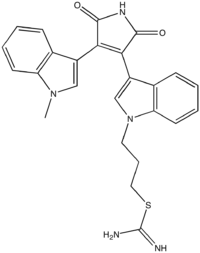All AbMole products are for research use only, cannot be used for human consumption.

Ro 31-8220 inhibits MAPK and ERK2, in rat adipocytes and L6 myotubes. Ro 31-8220 also inhibits voltage-dependent Na+ channels in the micromolar range assessed by several independent criteria. Treatment of HMDMs with structurally distinct pan-PKC inhibitors (calphostin C, Ro-31-8220, Go6976) and a PKC inhibitory peptide all significantly decreased apoE secretion without significantly affecting apoE mRNA or apoE protein levels. RO 31-8220 enhances epinephrine-induced platelet aggregation in catecholamine hypo-responsive platelets by enhancing Akt phosphorylation. Ro 32-0432, which showed a 10-fold selectivity for PKC-alpha and a 4-fold selectivity for PKC-beta I over PKC-epsilon.
| Molecular Weight | 457.55 |
| Formula | C25H23N5O2S |
| CAS Number | 125314-64-9 |
| Solubility (25°C) | DMSO |
| Storage |
Powder -20°C 3 years ; 4°C 2 years In solvent -80°C 6 months ; -20°C 1 month |
| Related PKC Products |
|---|
| Sapintoxin D
Sapintoxin D is a fluorescent phorbol ester that can be used to study the activation of protein kinase C (PKC). |
| Bryostatin 3
Bryostatin 3, a macrocyclic lactone, is a protein kinase C activator, with a Ki of 2.75 nM. |
| Ruboxistaurin mesylate
Ruboxistaurin (LY333531) mesylate is an orally active, selective and ATP competitive PKCβ inhibitor with IC50 values of 4.7 and 5.9 nM for PKCβI and PKCβII, respectively. |
| PKC β pseudosubstrate
PKC β pseudosubstrate is a selective cell-permeable inhibitor of PKC. |
| Protein Kinase C (19-31)
Protein Kinase C (19-31), a peptide inhibitor of protein kinase C (PKC), is used as protein kinase C substrate peptide for testing the protein kinase C activity. |
All AbMole products are for research use only, cannot be used for human consumption or veterinary use. We do not provide products or services to individuals. Please comply with the intended use and do not use AbMole products for any other purpose.


Products are for research use only. Not for human use. We do not sell to patients.
© Copyright 2010-2024 AbMole BioScience. All Rights Reserved.
